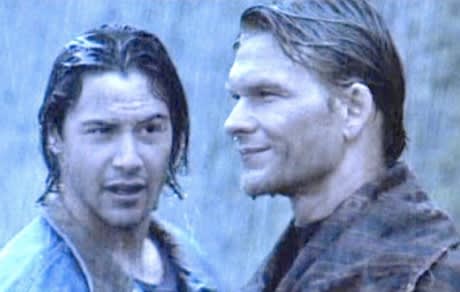Though still early in her career, coming just four years after her critically renowned cult hit Near Dark--a staple of a feminist and auteur film theory—the deceptively kinetic, undercover cop thriller Point Break demonstrated much of Kathryn Bigelow's trademark thematic discourse. Ostensibly, a male film, featuring stylized chase sequences, extensive violence and an endless stream of risky competitive one-upmanship, the underlying critique of masculinity and snarky homoerotic subtext present the gender analysis and social commentary that the Oscar-winning director is now known for.
Superficially, this adrenaline-pumping action thriller follows the standard tropes of the genre, following eager young FBI recruit Johnny Utah (Keanu Reeves) into an undercover investigation of the surfer world after he learns of a connection between the ocean-based sport and a long string of unsolved bank robberies. Noting that the robberies are being conducted by a group of men wearing the masks of notably conservative presidents, the surfer lifestyle ethos—that of finding the perfect wave and embracing the freedom of open waters as metaphor for worldview—is presented as an idealized escape from the "straight" world, where Johnny Utah goes through the motions of inherited social order.
In adapting to the way of the waves, Johnny encounters, and resultantly woos, the intentionally androgynous surfer girl Tyler (Lori Petty), giving him a partial "in" with a local gang of ripped, blond, surfer pretty boys led by the charismatic Bodhi (Patrick Swayze). Routinely goaded into dangerous situations—night surfing, fights and eventually skydiving—his relationship with Bodhi is far more intense than any of his romantic dalliances with Tyler, and is based almost entirely on male domination and subjugation, with Johnny giving in to Bodhi's will and impressing him with his ability to acquiesce and perform under pressure.
And in the midst of Bigelow's impressively choreographed action and wholly intense tone, it's the Bodhi and Johnny's inability to let go of each other, or pull the trigger when they need to, which drives the narrative forward.
Despite some amusing and telling inserts—Johnny Utah realizes who the bank robbers really are when he gets a look at his surfer buddy's bare ass—this early '90s mainstream work maintains its game face throughout, mirroring Johnny's questioning of the "straight" life with Bodhi's outright refusal to adapt to it. Bigelow's intentions are more obvious during the final moments, when Johnny is more remorseful about the loss of Bodhi than relieved by the rescue of his girlfriend Tyler, but these knowing stabs and the innately homoerotic relationship of male bonding—and violence as a result of unrealized sexual tension—aren't overt enough to alienate the audience Point Break simultaneously targets and criticizes.
Though Bigelow continues to experiment with gender roles, deconstructing masculinity perfectly, her core assertions are still present. The distinction seems only to be that her works have been more epic, yet subtler, of late, trying to expose a dominant social problem that eludes and perplexes those that are implicated.
Point Break screens at the TIFF Bell Lightbox as part of the Whoa: The Films of Keanu Reeves retrospective at 9:45pm on February 8th, 2013.
(Fox)Superficially, this adrenaline-pumping action thriller follows the standard tropes of the genre, following eager young FBI recruit Johnny Utah (Keanu Reeves) into an undercover investigation of the surfer world after he learns of a connection between the ocean-based sport and a long string of unsolved bank robberies. Noting that the robberies are being conducted by a group of men wearing the masks of notably conservative presidents, the surfer lifestyle ethos—that of finding the perfect wave and embracing the freedom of open waters as metaphor for worldview—is presented as an idealized escape from the "straight" world, where Johnny Utah goes through the motions of inherited social order.
In adapting to the way of the waves, Johnny encounters, and resultantly woos, the intentionally androgynous surfer girl Tyler (Lori Petty), giving him a partial "in" with a local gang of ripped, blond, surfer pretty boys led by the charismatic Bodhi (Patrick Swayze). Routinely goaded into dangerous situations—night surfing, fights and eventually skydiving—his relationship with Bodhi is far more intense than any of his romantic dalliances with Tyler, and is based almost entirely on male domination and subjugation, with Johnny giving in to Bodhi's will and impressing him with his ability to acquiesce and perform under pressure.
And in the midst of Bigelow's impressively choreographed action and wholly intense tone, it's the Bodhi and Johnny's inability to let go of each other, or pull the trigger when they need to, which drives the narrative forward.
Despite some amusing and telling inserts—Johnny Utah realizes who the bank robbers really are when he gets a look at his surfer buddy's bare ass—this early '90s mainstream work maintains its game face throughout, mirroring Johnny's questioning of the "straight" life with Bodhi's outright refusal to adapt to it. Bigelow's intentions are more obvious during the final moments, when Johnny is more remorseful about the loss of Bodhi than relieved by the rescue of his girlfriend Tyler, but these knowing stabs and the innately homoerotic relationship of male bonding—and violence as a result of unrealized sexual tension—aren't overt enough to alienate the audience Point Break simultaneously targets and criticizes.
Though Bigelow continues to experiment with gender roles, deconstructing masculinity perfectly, her core assertions are still present. The distinction seems only to be that her works have been more epic, yet subtler, of late, trying to expose a dominant social problem that eludes and perplexes those that are implicated.
Point Break screens at the TIFF Bell Lightbox as part of the Whoa: The Films of Keanu Reeves retrospective at 9:45pm on February 8th, 2013.
